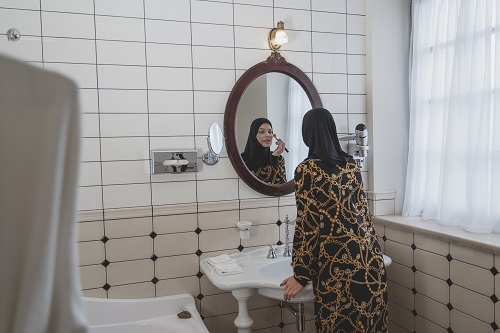If you’ve ever wondered about the toilet paper situation in Muslim countries, then you’re not alone. Although some Muslims can use toilet paper, most don’t—and there’s a good reason for this. If you’re curious about how people clean after going to the bathroom in Muslim cultures and how it differs from how Americans use toilet paper, we’ve got your answers right here.
What Do Muslims Use to Clean After Going to the Bathroom?
Islam requires its people to be clean at all times, including after going to the bathroom, which means that Muslims have a few different options for cleaning up. The standard cleaning method is to use water, often in the form of a bidet. A bidet can be handheld or installed in the bathroom. It is used to rinse off after toilet use.
In case bidets are unavailable, lota, a small-sized vessel with a spouted globular shape, is used. The lota is filled with water and used to rinse after pooping.
Because Muslims favor using water to clean, it does not mean they don’t use toilet paper. Toilet paper is only used as a last resort. However, most Muslims prefer to use water as much as possible.
Why do Muslims Use Water in the Bathroom?
Muslims use water in the bathroom because it’s part of their culture and religion. Cleanliness is essential in Islam, and Muslims believe they can achieve it by washing themselves with water.
The Prophet Muhammad once said, “Cleanliness is half of faith.” This means that a Muslim who believes in God will also follow his instructions, including how to maintain a clean body.
Another reason Muslims use water in the bathroom is its effectiveness. Unlike tissue paper, water doesn’t leave behind any residue or dirt. Water ensures all the tiny debris between your butt cheeks is gone, making you feel much cleaner. With this degree of cleanliness, you can’t be worried about stained pants, unwanted odors, or any other embarrassment.
Muslim Bathroom Etiquette
- Muslims are encouraged to say a Dua before going to the bathroom. This Dua is used to ask for forgiveness and protection from evil. It goes as follows: “O Allah, I seek refuge with You from the male and female shayateen.”
- After saying the Dua, Muslims first enter the bathroom with their left foot.
- Muslims are also advised not to linger in the toilet after finishing their business. Once they have finished, they should exit the bathroom as quickly as possible. They are also not encouraged to talk, initiate or respond to greetings in the bathroom.
- If the bathroom is communal and it happens that two or more men are defeating together, they are not allowed to converse and even to look at each other’s genitals.
- Eating any type of food in the bathroom is not allowed.
- Once Muslims finish their business, they need to clean up using water. The left hand should be the one doing the cleaning, while the right hand is for noble causes such as eating and treating people.
- Immediately after exiting the bathroom, Muslims again need to say a Dua (prayer), thanking Allah. “Praise be to Allah who relieved me of the filth and gave me relief.” They exit the bathroom with the right foot.
- Use of stones: If water, cloth or paper is unavailable, Muslims are permitted to use stones. One must use three stones to clean themselves thoroughly.
What Countries Do Not Use Toilet Paper?
Some countries do not use toilet paper. This can be due to culture or religion. It is common for Middle Eastern countries such as Iran, Afghanistan and Pakistan to not use toilet paper.
Instead, they use water to clean themselves after using the bathroom. The same goes for India and other Asian nations.
Arab countries: Most Arab countries do not often use toilet paper. Instead, they prefer the water, as discussed earlier. Recently, Turkey’s top religious body has allowed the use of toilet paper, according to Hurriyet Daily News. “If water cannot be found for cleansing, other cleaning materials can be used. Even though some sources deem paper to be unsuitable as a cleaning material, as it is an apparatus for writing, there is no problem in using toilet paper,” part of the statement said.
India: Toilet paper is not easily accessible in India. While you may find toilet paper in hotels and some stores (particularly tourist spots), most homes don’t have them stocked up—instead, people here use water to clean themselves when necessary.
China, Thailand, and other Asian Countries: In many Asian countries, it is very hard to find toilet paper in stores. In some hotels, the bathroom may provide a roll for your use. Because toilet paper was originally invented in China, it is rather odd that the Chinese use this product less.
Frequently Asked Questions About Muslim Toilet Etiquette
Q. Do Muslims use both hands to clean themselves after using the bathroom?
A. No. Only the left hand is used.
Q. Can Muslims use toilet paper?
A. Yes, but only if water is unavailable. They prefer water.
Q. How to clean private parts in Islam?
A. Like all things, it is best to clean the private parts with water.
Q. Do Muslims use toilet seats?
A. Yes. However, there are places with no toilet seats. There is only a hole where one is required to squat while relieving themselves. This is the case for many people in rural areas.
Q. Can Muslims use public toilets?
A. Yes, but they must follow the rules of cleanliness. They must also respectfully use the facilities and leave them clean.
In Summary
So, do Muslims use toilet paper? Muslims use water to clean themselves after using the toilet, though it is not uncommon to find Muslims who use tissue to wipe themselves. Note that cleaning after going to the bathroom is necessary for everyone, not only Muslims. It is both hygienic and respectful.
It is also a way to show that you care about your body and the well-being of others. Cleaning your butt also helps prevent the spread of diseases. Pick the most comfortable way of cleaning your butt, and enjoy the clean feeling it gives you and all the other benefits it comes with.


